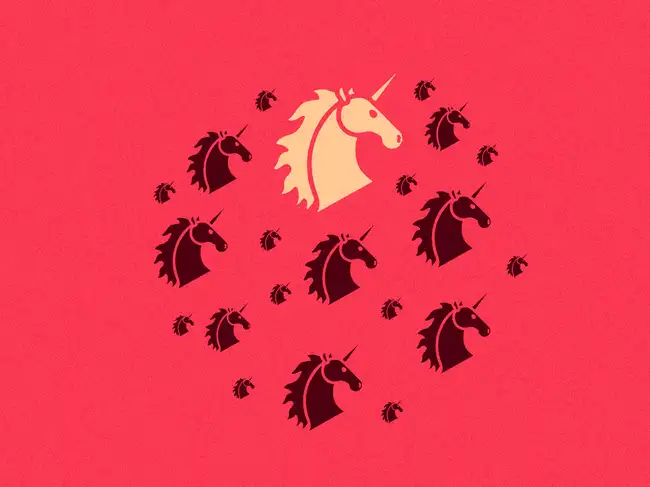The year started with a boom, with Netradyne crossing the $1 billion valuation mark just days into the new year. However, this momentum has tapered off, with only a handful more startups achieving the unicorn status.
In 2025, after Netradyne, logistics platform Porter, pet food startup Drools, omnichannel jewellery retailer BlueStone and business-to-business (B2B) marketplace Jumbotail turned unicorns.
The figures of 2025 are far from 2021, the boom year when 45 unicorns were minted. However, industry insiders term that year an anomaly due to multiple factors creating a perfect storm for the fast growth.
Not unicorns, but camels
Apart from macroeconomic uncertainty and geopolitical issues, investors started treading more cautiously after the exuberant period of 2021, prioritising profitability and sustainable unit economics over a “growth-at-all-costs” mindset. Industry experts said there may not be a return to the frantic 2021 period anytime soon.
“Fund managers are now strongly committed to thesis-driven investing, resulting in a metric-driven valuation approach and, consequently, more appropriate valuations in new funding rounds. This is most visible in the slower pace of new unicorn creations in India,” Abhishek Prasad, managing partner, Cornerstone Ventures, told ET.
Investors are also examining elements like burn rate, gross margins, and customer acquisition costs more closely to generate positive cash flows and sustainable profits, rather than just strong topline growth.
“I expect India will add two to three additional unicorns over the next six months and at least another five to seven in 2026,” he said, adding that a repeat of the record-breaking 2021 levels is unlikely.
VCs have also acknowledged overvaluation concerns during the 2021 period, where the value of startups was inflated due to competition among venture funds. Since then, many companies have seen downrounds, including Unacademy, Meesho and Cred.
“Earlier, the Tigers and SoftBanks were making quick decisions and paying very high valuations. They are not that active now,” Sateesh Andra of early-stage venture fund Endiya Partners told ET. “Post-Covid, there was a digital adoption and zero-interest rate period. Now, there is valuation compression, and it’s a very different environment now,” he added.
Industry insiders said enterprise firms adopting artificial intelligence (AI) and companies in defense, deeptech and healthcare sectors could gain unicorn status going forward.
Numbers game
According to Tracxn data, India has 119 unicorn startups. Government data also shows that the ecosystem has expanded between 2021 and 2024.
The Department for Promotion of Industry and Internal Trade (DPIIT) had recognised approximately 1.57 lakh startups at the end of 2024. Of these, 1.4 lakh were added in the first half of the year.
2021: the record-breaking year
Forty-five new unicorns were minted in India in 2021, setting a new record for the number of successful businesses in the country. As a result, the nation added a unicorn almost every nine days. Eighty-four Indian startups were valued at more than $1 billion at the end of the year. The year also saw many firsts, such as the emergence of India’s first unicorn in the healthcare, cryptocurrency, and real estate industries.
What drove this? With the Covid-19 pandemic and the subsequent lockdowns, there was heightened demand for digital services, with consumers and businesses adopting online solutions for everything from education to ecommerce, food delivery, and payments. Remote work also pushed the adoption of software-as-a-service (SaaS) firms.
2022: falling off the peak
Come 2022, India’s unicorn creation rate fell sharply, with only 22 firms reaching billion-dollar valuations, down roughly 50% from 45 in 2021. The year also saw a change in the industry, with SaaS firms surpassing fintechs as the top area for new unicorns.
Mamaearth, Fractal Analytics, LEAD, Xpressbees, Uniphore, CredAvenue, Amagi, Oxyzo and PhysicsWallah were among the 24 businesses that became members of the unicorn club.
2023: funding winter begins
In 2023, the impact of the funding winter became evident as India witnessed only two new unicorns, down from a record 45 in 2021 and 24 in 2022. Zepto and InCred were the only two startups joining the unicorn club.
After raising $200 million in a funding round that valued the fast commerce startup at $1.4 billion, Zepto became a unicorn in August 2023. After that, InCred Finance joined the unicorn club in November 2023 with a Series D fundraising round of Rs 500 crore ($60 million).
2024: slow comeback
With six businesses turning into unicorns in 2024, the startup sector appeared to be rebounding. Bhavish Aggarwal, the CEO of Ola Electric, established Krutrim AI, which led the charge and raised $50 million at a $1 billion valuation in January, making it the year’s first unicorn.
This year, the unicorn cohort included financial technology platform Perfios, ride-hailing startup Rapido, travel tech company RateGain, electric car manufacturer Ather Energy, and lending company Moneyview.




